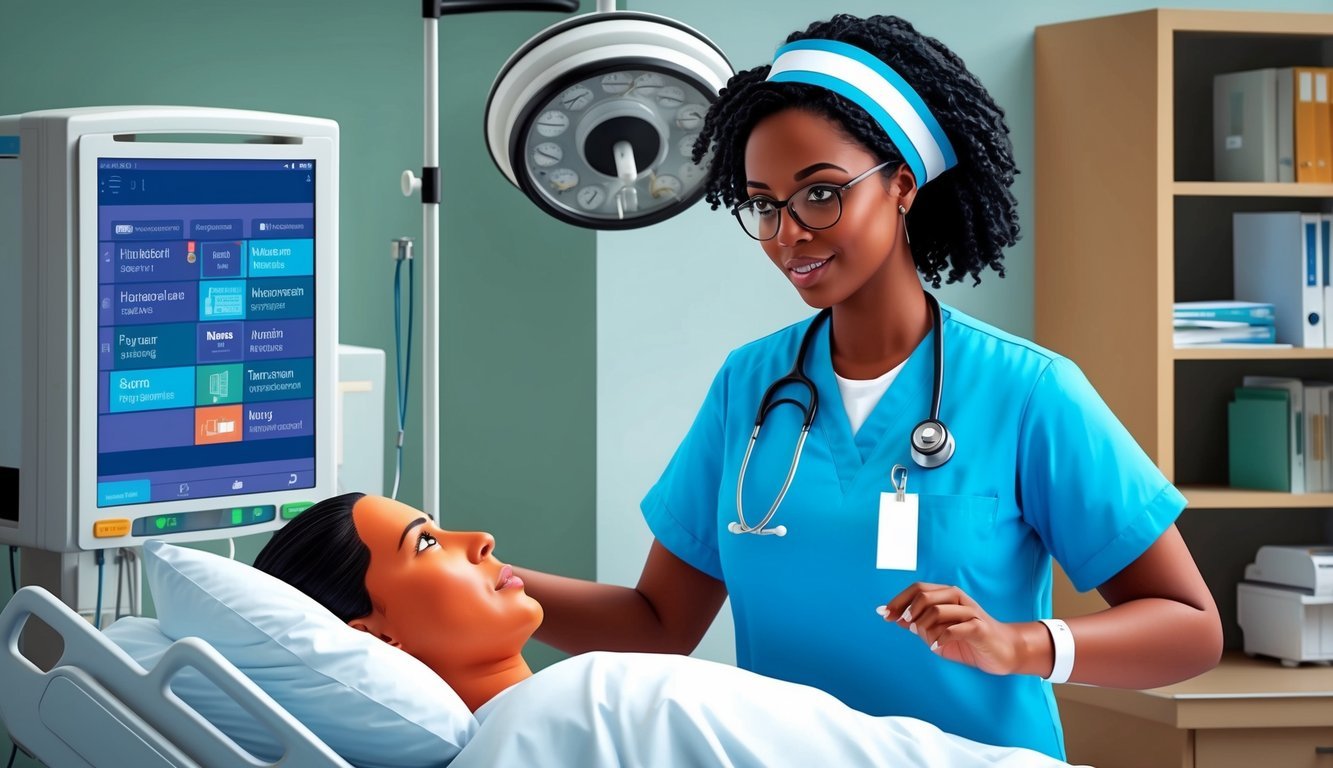Exploring nursing programs in Minnesota offers a wealth of opportunities to pursue a rewarding career in healthcare.
If you’re interested in becoming a registered nurse, various accredited programs provide the education and training needed to excel in this crucial field. The Bachelor of Science in Nursing (BSN) is often the preferred degree for aspiring nurses, as it equips you with advanced clinical skills and critical thinking abilities.
In Minnesota, you can find numerous nursing education options, from traditional in-person classes to online and accelerated programs.
Schools like the University of Minnesota offer robust training designed to meet the evolving demands of patient care. As you consider your options, it’s essential to research the accreditation of each program and understand the specifics of their curricula.
As you embark on your journey to becoming a nurse, make sure to explore various nursing programs available in Minnesota.
Many institutions provide specialized tracks, allowing you to tailor your education to fit your career goals.
With the right program, you can become well-prepared to navigate the challenges of nursing while making a meaningful impact on patients’ lives.
Overview of Nursing Education in Minnesota

Nursing education in Minnesota is robust and offers various paths to becoming a licensed nurse.
Whether you are looking for an entry-level position or aiming for higher qualifications, the state provides multiple degree options and adheres to strict educational standards.
Types of Nursing Degrees Offered
In Minnesota, you can pursue several types of nursing degrees, each catering to different career goals.
The primary options include:
-
Associate Degree in Nursing (ADN): Typically a two-year program that prepares you for entry-level nursing positions. Community colleges across the state often offer this option.
-
Bachelor of Science in Nursing (BSN): A four-year degree provided by universities. This program offers a deeper understanding of patient care, healthcare systems, and leadership. Many employers prefer BSN graduates for a broader scope of practice.
-
Master of Nursing (MN): Designed for those seeking advanced practice roles or leadership positions, this degree typically requires a BSN as a prerequisite.
These programs are an essential step toward obtaining licensure as a registered nurse (RN) in Minnesota.
Statewide Nursing Education Standards
Minnesota has established rigorous standards for nursing education to ensure quality and consistency across programs.
The state adheres to guidelines set by the Minnesota Board of Nursing, which emphasizes:
-
Accreditation: All nursing programs must be accredited by recognized bodies such as the Commission on Collegiate Nursing Education or the Accreditation Commission for Education in Nursing. This ensures that programs meet high educational standards.
-
Curriculum Requirements: Programs are required to cover essential topics, including anatomy, physiology, nursing theory, and clinical practice. This comprehensive approach equips you with the necessary skills for patient care.
-
Clinical Experience: A significant component of nursing education involves hands-on clinical training. Students must complete a prescribed number of hours in clinical settings to apply theoretical knowledge practically.
These standards are critical for maintaining the integrity and effectiveness of nursing education in the state, contributing to the overall quality of healthcare in Minnesota.
Exploring Nursing Schools in Minnesota

Minnesota offers a variety of nursing programs that cater to different educational needs.
Whether you are looking for a traditional undergraduate degree or a graduate program, you can find several options across the state.
Key institutions like Minnesota State University Moorhead and schools in St. Paul provide unique pathways to becoming a registered nurse.
Nursing Programs at Minnesota State University Moorhead
Minnesota State University Moorhead (MSUM) provides a comprehensive nursing program through its School of Nursing.
The Bachelor of Science in Nursing (BSN) is designed to equip you with both theoretical knowledge and practical skills.
Key Features:
- Accreditation: Fully accredited by the Commission on Collegiate Nursing Education (CCNE)
- Clinical Experience: Opportunities for hands-on training in various healthcare settings
- NCLEX Success: High passing rates for graduates on the NCLEX-RN examination
The curriculum emphasizes critical thinking and evidence-based practice, ensuring you are prepared for the demands of nursing.
Graduates are well-regarded in the Minnesota healthcare community, often finding employment quickly.
Comparison of Nursing Schools in St. Paul
St. Paul is home to several prominent nursing schools, each offering unique programs and advantages.
Here are two key institutions:
| School Name | Degree Offered | Special Features |
|---|---|---|
| St. Catherine University | BSN, MSN | Focus on women’s leadership in healthcare |
| University of St. Thomas | BSN, DNP | Emphasizes ethical practices and community engagement |
Both schools provide excellent educational frameworks, with robust clinical experiences.
Tuition and program lengths can vary, so be sure to explore financial aid options and specific entry requirements.
In St. Paul, the nursing education landscape is competitive, preparing you for diverse roles in healthcare.
Whether pursuing a BSN or a more advanced degree, you will benefit from the rich academic community and extensive networking opportunities.
Admission Process for Nursing Programs
The admission process for nursing programs varies by institution, but it generally includes certain key factors that you should understand.
Acceptance rates and application requirements play significant roles in your chances of securing a spot.
Understanding Acceptance Rates
Acceptance rates for nursing programs can be highly competitive.
Many universities in Minnesota, such as the University of Minnesota, have specific metrics regarding their admission statistics.
| University | Acceptance Rate |
|---|---|
| University of Minnesota | Approximately 30% |
| St. Cloud State University | Varies, but often lower than 50% |
| Minnesota State University, Mankato | Approximately 40% |
These rates indicate how selective each program is.
A lower acceptance rate means that you will need a stronger application to increase your chances.
Prerequisites and Application Requirements
Before applying, you must meet specific prerequisites.
These may include:
- High school diploma or equivalent
- Cumulative GPA requirements (usually 3.0 or higher)
- Completed prerequisite courses (e.g., biology, chemistry)
Most programs also require you to submit a complete application package that includes:
- Nursing supplemental questions
- Official transcripts
- Recommendation letters
Ensure that you carefully review the requirements for each program, as they vary.
The University of Minnesota’s nursing admissions page provides detailed information on their specific criteria.
Understanding these aspects will help you better prepare for the admission process in nursing programs in Minnesota.
Curriculum and Instruction in Nursing Courses

In nursing programs, the curriculum is designed to provide you with the essential knowledge and skills needed to excel in the healthcare field.
The focus is on both core nursing courses and elective opportunities, allowing you to tailor your education according to your interests.
The role of nursing faculty is also crucial, helping you navigate your educational journey effectively.
Core Nursing Courses and Electives
Core nursing courses are fundamental to your training, covering essential topics like anatomy, physiology, pharmacology, and clinical practice.
These courses ensure that you acquire the foundational knowledge required for nursing.
Elective courses provide additional specialization options.
Examples include mental health nursing, pediatric nursing, and community health nursing.
These electives enable you to explore specific interests and prepare for various career paths.
Most nursing programs require a combination of theoretical knowledge and practical experience attained through clinical placements, where you can apply what you’ve learned in real-world settings.
Role of Nursing Faculty
Nursing faculty play a vital role in shaping your educational experience.
They are typically experienced practitioners who bring real-world insights to the classroom.
Their expertise enhances your learning and prepares you for the challenges of a nursing career.
Faculty members also provide guidance and mentorship, helping you navigate both academic and clinical environments.
They facilitate interactive learning strategies such as simulations, labs, and discussions that promote critical thinking and problem-solving skills.
You will have opportunities for one-on-one interactions with faculty, enabling you to seek personalized advice tailored to your career aspirations.
This relationship fosters a supportive learning environment that can enhance your educational outcomes.
Practical Training and Clinical Experiences

Practical training is a crucial component of nursing education, providing you with hands-on experience that enhances your nursing practice.
Engaging in clinical rotations and collaborating with classmates allows you to develop essential skills in real-world healthcare settings.
Clinical Rotations in Nursing Education
Clinical rotations are structured training periods where you work in various healthcare environments.
These experiences allow you to apply theoretical knowledge in practice.
During rotations, you will:
- Conduct patient assessments
- Administer medications
- Collaborate with healthcare teams
This training helps in understanding patient care, as you learn vital nursing skills in settings such as hospitals, clinics, and nursing homes.
Institutions like Minnesota State College emphasize the importance of clinical experiences.
Through these placements, you become familiar with different patient populations and specialized care areas.
Collaboration with Classmates and Professionals
Working closely with classmates during practical training fosters teamwork and enhances learning.
Engaging in group projects, study sessions, and simulation labs helps build a supportive network among peers.
Additionally, collaborating with experienced professionals provides insight into best practices and mentorship opportunities.
They can guide you through complex scenarios and share their real-world experiences, enriching your nursing education.
By participating in discussions, clinical debriefings, and peer assessments, you gain diverse perspectives that improve your critical-thinking skills.
Connecting with classmates and professionals creates a rich learning environment essential for your development as a nurse.
Career Outcomes for Nurses in Minnesota

The career outcomes for nurses in Minnesota are promising, with various avenues available for both registered nurses and those seeking advanced roles.
You will find a diverse range of opportunities that reflect the state’s strong healthcare system and growing demand for nursing professionals.
Prospects for Registered Nurses (RN)
Registered Nurses (RNs) in Minnesota benefit from a high employment rate and robust job prospects.
The state boasts a 100% employment rate for graduates of nursing programs, indicating strong demand in the healthcare sector.
Key factors contributing to the job outlook include:
- Diverse Work Settings: RNs work in hospitals, clinics, schools, and community health organizations.
- Competitive Salaries: The average annual salary for RNs in Minnesota tends to be above the national average, providing financial stability.
- Continuing Education: Many employers support ongoing professional development, enhancing your career trajectory.
You can explore specific career resources through Minnesota State University Moorhead for more detailed outcomes for RNs.
Advanced Nursing Careers and Specializations
The pathway to advanced nursing careers is well defined in Minnesota.
After gaining experience as an RN, you can pursue specializations that enhance your expertise and marketability.
Common advanced roles include:
- Nurse Practitioner (NP): These professionals can diagnose conditions and prescribe medications. They often focus on specific populations such as pediatrics or geriatrics.
- Clinical Nurse Specialist (CNS): This role involves providing expert care in particular areas of nursing practice.
- Nurse Educator: Focusing on training the next generation of nurses, this role is crucial for maintaining high standards in nursing education.
Graduates of programs like the Master of Nursing at the University of Minnesota acquire essential competencies.
These competencies prepare them for these advanced positions.

